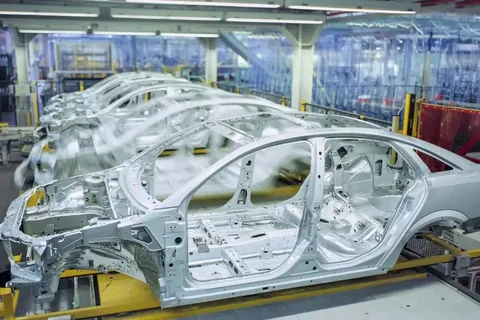
The lightweight automotive body panels industry is projected to be valued at USD 122,054.9 million in 2023 and is anticipated to grow to USD 191,369.2 million by 2033. Market sales are expected to increase at a notable CAGR of 4.6% over the forecast period.
The Lightweight Automotive Body Panels Industry is emerging as a cornerstone of modern vehicle manufacturing, driven by the dual imperatives of improving fuel efficiency and reducing environmental impact. Lightweight body panels, crafted from advanced materials such as aluminum, carbon fiber composites, and high-strength steel, are revolutionizing automotive design by reducing overall vehicle weight without compromising structural integrity or safety.
With the rise of electric and hybrid vehicles, lightweight materials are crucial for enhancing battery efficiency and extending driving range. Automakers are investing heavily in lightweighting technologies to meet stringent emission regulations and cater to consumer demand for eco-friendly, high-performance vehicles.
The industry’s growth is underpinned by continuous innovation in material science, manufacturing processes, and design optimization. Additionally, collaborations between automotive manufacturers and material suppliers are fostering the development of cost-effective solutions, making lightweight body panels accessible across various vehicle segments.
In-Depth Market Analysis: A Complete Report
Key Drivers:
- Stringent Emission Regulations: Governments worldwide are enforcing strict emission standards, prompting automakers to adopt lightweight materials to reduce carbon footprints.
- Rising Demand for Fuel Efficiency: Lightweight body panels contribute to lower fuel consumption, appealing to consumers seeking cost-effective and eco-friendly vehicles.
- Growth of Electric and Hybrid Vehicles: The lightweighting of automotive components is critical to improving energy efficiency and range in electric and hybrid vehicles.
- Advances in Material Technology: Innovations in aluminum alloys, carbon fiber, and high-strength steel are enabling the production of lightweight yet durable body panels.
- Consumer Preference for Performance: Lightweight vehicles offer improved acceleration, handling, and braking performance, driving demand for lightweight body panels.
- Focus on Sustainability: Automakers are prioritizing recyclable and eco-friendly materials to align with global sustainability goals and consumer expectations.
- OEM-Aftermarket Collaboration: Partnerships between original equipment manufacturers (OEMs) and suppliers are fostering innovation and scalability in lightweight body panel production.
Key Takeaways:
- Efficiency Meets Sustainability: Lightweight body panels are at the forefront of efforts to enhance vehicle efficiency while reducing environmental impact.
- Critical for EV Development: The rise of electric and hybrid vehicles underscores the importance of lightweight materials for optimizing battery performance and range.
- Regulations Drive Adoption: Stringent emission and fuel efficiency standards are accelerating the adoption of lightweight automotive body panels globally.
- Material Innovations Propel Growth: Advances in materials such as carbon fiber composites and aluminum alloys are enabling stronger, lighter, and more cost-effective designs.
- Performance and Aesthetics: Lightweight body panels not only improve vehicle dynamics but also allow for creative and aerodynamic design possibilities.
- Scalable Solutions for All Segments: Continuous innovation and cost reduction efforts are making lightweight body panels viable for both premium and mass-market vehicles.
Competitive Landscape
Due to the presence of various domestic and regional players, the global lightweight automotive body panels market has become highly competitive and fragmented in nature. Moreover, prominent lightweight automotive body panel manufacturers are launching new products, establishing new facilities, and collaborating and partnering with vehicle manufacturers for better market opportunities. GORDON AUTO BODY PARTS CO. LTD; AUSTEM COMPANY LTD.; Gestamp; Plastic Omnium; Magna International Inc.; Stick Industry Co. Ltd.; Changshu Huiyi Mechanical & Electrical Co. Ltd.; KUANTE AUTO PARTS MANUFACTURE CO. LIMITED; Hwashin; FLEX-N-GATE CORPORATION; ABC Group, Inc
For instance,
- In 2018 Magna launched a new composites center of excellence in Germany to help European automakers meet increasingly stringent emissions requirements with lightweight structures and exterior components made of advanced materials.
Key Segments Covered in the Lightweight Automotive Body Panels Market Report
By Material Type:
- Metals
- High-strength Steel
- Magnesium
- Aluminum
- Polymers & Composites
- Carbon Fiber Reinforced Plastics
- Glass Fiber Reinforced plastics
- Other Polymer & Composite Materials
By Component Type:
- Bumpers
- Hood
- Door Panels
- Trunk Lids
- Roof
- Others
By Vehicle Type:
- Light Commercial Vehicle
- Heavy Commercial Vehicle
By Region:
- North America
- Latin America
- Western Europe
- Eastern Europe
- Asia Pacific Excluding Japan (APEJ)
- Japan
- The Middle East & Africa (MEA)
About Future Market Insights (FMI)
Future Market Insights, Inc. (ESOMAR certified, recipient of the Stevie Award, and a member of the Greater New York Chamber of Commerce) offers profound insights into the driving factors that are boosting demand in the market. FMI stands as the leading global provider of market intelligence, advisory services, consulting, and events for the Packaging, Food and Beverage, Consumer Technology, Healthcare, Industrial, and Chemicals markets. With a vast team of 400 analysts worldwide, FMI provides global, regional, and local expertise on diverse domains and industry trends across more than 110 countries.
Contact Us:
Future Market Insights Inc.
Christiana Corporate, 200 Continental Drive,
Suite 401, Newark, Delaware – 19713, USA
T: +1-347-918-3531
For Sales Enquiries: sales@futuremarketinsights.com
Website: https://www.futuremarketinsights.com
LinkedIn| Twitter| Blogs | YouTube